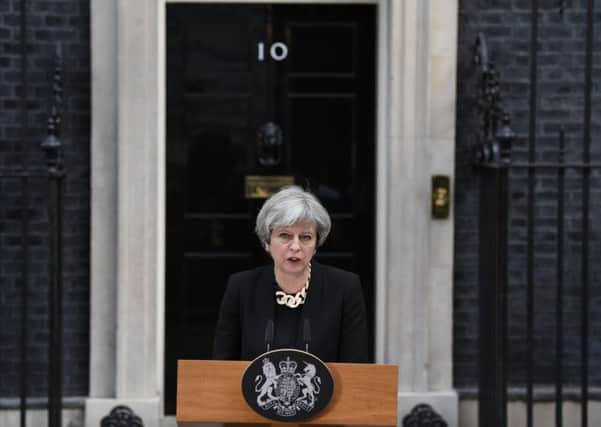Martyn McLaughlin: Rash call for new powers belies May's inept record


The law, Bertolt Brecht once cautioned, was made for one thing alone; the exploitation of those who do not understand it. When the legislation in question is aimed at countering the spectre of terrorism, the German dramatist’s warning becomes particularly prescient.
If Theresa May retains her hold on power after tomorrow’s general election, new powers to thwart the threat of Islamic extremism will be at the forefront of her government’s agenda. In the wake of the weekend’s barbarous attack on south London, the Prime Minister dispensed with formalities, offering not soothing reassurances, but a declaration of ideological warfare.
Advertisement
Hide AdAdvertisement
Hide AdGiven this was the third such atrocity on British soil in as many months, her toughened stance found favour with many observers. I am not among them. The problem is not that Mrs May’s speech outside Downing Street was overly political – which it most certainly was – but that it demonstrated the worst kind of on-the-hoof policymaking regarding one of the greatest challenges facing this generation.
Barely 12 hours had passed since the carnage in London Bridge when Mrs May advocated a wholesale review of the UK’s counter-terrorism strategy so as to ensure the police and security services “have all the powers they need”.
The attacks clearly pose a new challenge. The methodology which weaponises vehicles and deploys blades instead of bombs is devastating in its crudity, and stretches the security services. But our response, especially one delivered through a legislative prism, must be considered and evidence-based.
Mrs May’s speech signalled an escalation in Britain’s fight against terror, but her career in government has been largely defined by a failure to reconcile her rhetoric on extremism with purposeful policy. Only last year, the Conservatives announced a new Counter-Extremism and Safeguarding Bill, designed to ban extremist organisations and empower civic authorities to close premises used to “promote hatred”. The law, spearheaded by Mrs May, then home secretary, was hailed as a powerful new weapon. Yet more than a year on, it is gathering dust, deemed an unworkable and rash exercise in administrative folly.
The reason for the bill’s non-appearance is an important one in light of Mrs May’s calls for yet more powers. It defined extremism as “the vocal or active opposition to our fundamental values, including democracy, the rule of law, individual liberty and the mutual respect and tolerance of different faiths and beliefs”.
When the draft legislation appeared on the desks of the government’s lawyers, the red pens came out. The working definition of extremism, they decided, was not only legally unacceptable, but was at odds with other fundamental values, such as freedom of speech, freedom of religion and freedom to protest.
If Mrs May could not delineate what she meant by extremism to the satisfaction of her government, or indeed her peers (the cross-party joint committee on human rights ruled the bill was predicated on questionable assumptions, such as the idea that religious conservatism can lead to support for violent jihadism) why should we have an iota of confidence in her ability to “stamp out” extremism now?
This is to say nothing of whether new powers are even necessary. That depends almost entirely on whether the intelligence surrounding the attacks on London and Manchester identify a specific threat which is not countered by the likes of stop and search, TPims, 14-day detention, and section 5 of the 2006 Terrorism Act, which allows police to arrest individuals who they suspect of planning an attack. Let us not forget that the majority of the attackers who struck at Britain in the past three months were known to security services.
Advertisement
Hide AdAdvertisement
Hide AdAs the legal commentator, David Allen Green, has pointed out, since the turn of the millennium, there have been around 100 statutory instruments introduced which contain the word, “terrorism”, in the title. The bundle of legislation, he notes, contains some of the “widest, most general provisions in the history of criminal and also surveillance law”. If the laws we have are an insufficient response, the rush to introduce yet more is no panacea.
It is little more than a week since Max Hill QC, the government’s independent reviewer of terrorism legislation, said he saw no need to create more statutory offences. Were it discovered that the Manchester bomber, Salman Abedi, had an accomplice, they would be likely to be charged under the Explosive Substances Act 1883, passed 130 years before the formation of IS.
Such durable Victorian legislation, allied with modern provisions, like the Terrorism Acts of 2000 and 2006, the Terrorist Asset Freezing Act 2010, and the Terrorism Prevention Investigation Measures Act 2011, poses a formidable arsenal.
What is needed, Mr Hill observed, is not new legal remedies, but something blunter. “Those who keep us safe, including [the] contingent of armed personnel we saw on our streets, need resources – rather than yet more law – to do the job,” he observed.
As the investigations into Westminster, Manchester, and London Bridge continue, it may well be the case that our law enforcement agencies require new powers, but a shift in strategy and financing may suffice. Whatever the change, it must serve the purpose of saving lives, not propagating the fallacy that we have a prime minster capable of leading the country through one of its most dangerous hours.